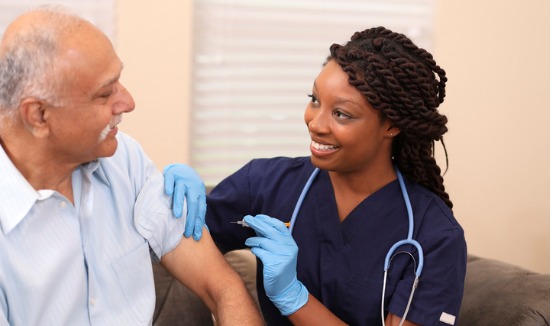Between influenza, SARS-CoV-2 (COVID-19), and Respiratory Syncytial Virus (RSV), doctors face the daunting challenge of keeping themselves – and their patients – healthy. These viruses spread mainly by droplets made when people cough, sneeze, or talk, which can then infect people who are nearby.
Seasonal Influenza (Flu)
Flu is a contagious respiratory illness that infects the nose, throat, and sometimes the lungs. It can cause mild to severe illness, and can lead to death in some instances.
Flu Facts:
- Influenza viruses can be detected in most infected persons beginning one day before symptoms develop and up to 5 – 7 days after becoming ill.
- People with the flu are most contagious in the first 3 – 4 days after their illness begins. However, infants and people with weakened immune systems may be contagious for 7+ days.
- Symptoms typically begin between 1 – 4 days after flu viruses infect a person’s respiratory tract. Thus, an infected person can spread the virus to their close contacts before symptoms begin to manifest themselves.
Coronavirus-19 (COVID-19)
COVID-19 often causes respiratory symptoms similar to a cold, the flu, and pneumonia. In some cases, it may affect more than just your respiratory system. COVID-19 has caused over 1.2 million deaths in the US as of June 1, 2024.
COVID-19 Facts:
- Older, immunocompromised, and individuals with other underlying health conditions are at higher risk for severe illness from COVID-19
- An infected person can transmit this virus up to 2 days prior to the appearance of symptoms, as well as while showing symptoms.
- Available data indicate that adults with mild to moderate COVID-19 remain infectious no longer than 10 days after symptoms begin. This estimate has been the same for variants of concern, such as Delta and Omicron. Many adults with severe to critical illness or severe immune suppression may remain infectious for up to 20 days after symptoms begin.
- Evidence shows that fully-vaccinated individuals who become sick with COVID-19 (referred to as ‘breakthrough infections’) can carry comparable amounts of virus as non-vaccinated people.
Respiratory Syncytial Virus (RSV)
RSV is a common respiratory virus that usually causes mild, cold-like symptoms.
RSV Facts:
Based on CDC estimates from September 29, 2024, through May 3, 2025, RSV has caused approximately 190,000 – 350,000 hospitalizations and 10,000 – 23,000 deaths in the United States.
- Adults at the highest risk for severe RSV illness include older adults and those with chronic heart or lung disease, weakened immune systems, or living in nursing homes or long-term care facilities.
- People infected with RSV are usually contagious for 3 – 8 days and may become contagious a day or two before symptoms appear. However, some infants and people with weakened immune systems can continue to spread the virus even after they stop showing symptoms, for as long as 4 weeks.
- Children are often exposed to and infected with this virus outside the home, such as in school or childcare centers. They can then transmit the virus to other members of the family.
What you can do to protect yourself, your patients, and your colleagues from getting sick
- Regular, correct use of masks and respirators. NIOSH-approved respirators (including well-fitting disposable surgical masks and KN95s) offer the highest level of protection. Masks may be particularly helpful in crowded indoor settings, as well as if you have a high risk of getting severely ill from respiratory viral infections.
- Clean your hands. Washing your hands regularly with an alcohol-based hand sanitizer or soap and water is a simple yet effective tool to stop the spread of germs.
- Clean and disinfect. Regular environmental cleaning is a necessity. Lobby areas, cafeterias, and waiting rooms are all high-traffic spaces. Disinfect reusable devices and do not reuse disposable items.
- Get vaccinated. Encourage everyone in your practice to get vaccinated against flu, COVID-19, and RSV (if eligible) to reduce spread and absenteeism. Recent studies show that flu vaccination reduces the risk of illness by 40-60% among the overall population during the season.
- Ensure HVAC maintenance is up-to-date. Consult with facilities management to ensure the heating, ventilation, and air conditioning, or HVAC, system is working efficiently for proper ventilation in your facility. Consider using high-efficiency particulate air, or HEPA filters in small spaces for an added layer of protection
Vaccine Information
The CDC recommends that adults aged 18 and older get anupdated COVID-19 vaccine to protect against the potentially serious outcomes of the virus. Parents of children aged 6 months to 17 years old should discuss vaccination with a healthcare provider.
RSV vaccines
The CDC Advisory Committee on Immunization Practices recommends the use of vaccines for people aged 60 years and older, using shared clinical decision-making. This means that these individuals may receive a single dose of the vaccine based on discussions with their healthcare provider about whether an RSV vaccine is right for them.
HealthCare Partners (HCP) is here to help!
HCP Pharmacy Staff
Call: (516) 515–8861
Monday through Friday, 8:30am – 5:30pm EST
HCP Case Managers
Call: (888) 258–0203
Monday through Friday, 8:30am – 5:30pm EST
Our Case Managers can:
- Teach patients about their condition.
- Guide them in making a treatment plan.
- Help them get medications and care.
- Coordinate transportation based on member’s assigned benefit.
- Set up referrals and doctor visits.
- Provide a Nurse on call, 24/7 at (516) 238-6124.
Download Protecting Yourself and Your Patients From Viral Respiratory Infections








